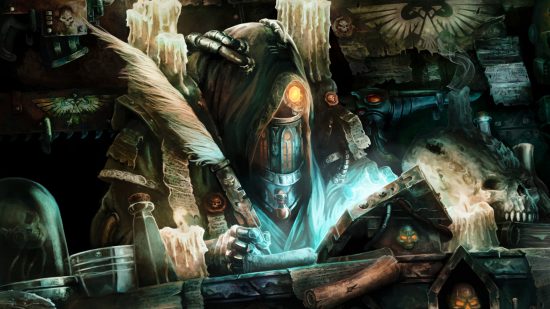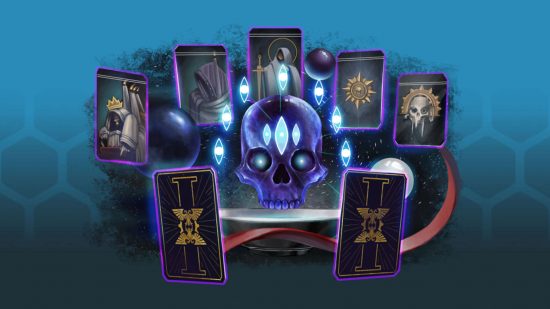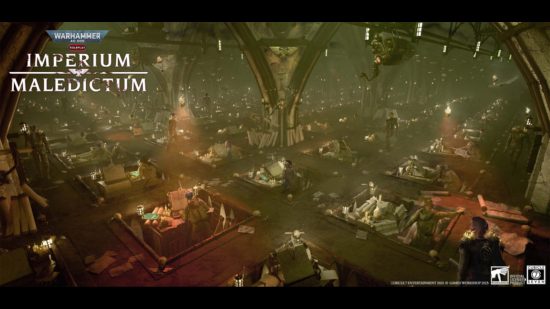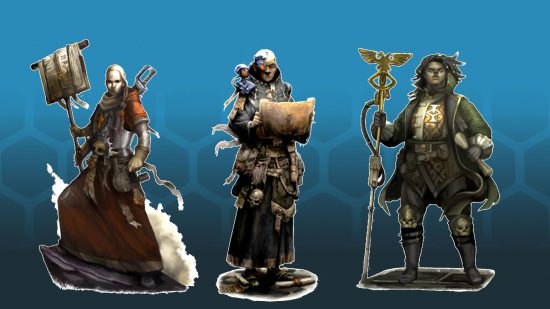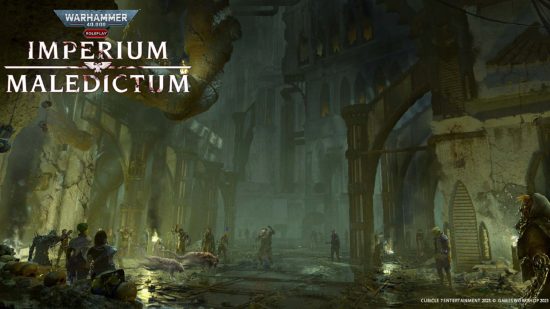The new Warhammer 40k RPG Imperium Maledictum was published in PDF form this March by design studio Cubicle 7. Billed as a game of “grim and treacherous adventure in the 41st millennium”, players adopt the role of disposable adepts in the service of a powerful patron, working to advance his or her agenda in service to the Imperium of Man.
Unlike Cubicle 7’s existing 40k RPG Wrath and Glory – on our list of the best tabletop RPGs – Imperium Maledictum is a gritty, deadly game, focused on conspiracy, intrigue, and investigation. The game is positioned as a spiritual successor to Dark Heresy and other 40k RPGs previously published by Fantasy Flight Games, and uses a similar d100 RPG dice system. It also shares a lot of DNA with the venerable Warhammer Fantasy Roleplay, also currently published by Cubicle 7.
Pádraig Murphy is Cubicle 7’s senior producer responsible for Warhammer games. In the run-up to Imperium Maledictum’s release we cornered him for an interview and, as well as describing the game’s brutal combat and catastrophic psychic perils, he promised to run a demo session for us, if only we’d release him from the interrogation cell. A little later, my colleague Mollie Russell and I showed up in a video chat, demanding Murphy make good on his promise.
With just two hours to scoot through a new adventure – freshly approved by the lore masters at Games Workshop – Murphy offered us pre-gen characters. But what is an RPG without the character creation experience? Or, indeed, without wasting the GM’s time with digressions, inanity, and generally dicking around? So our session started with character creation.
To be specific, it started with Patron creation. The Patron is a comparatively powerful NPC in some branch of the hierarchy of the Imperium of Man. They’re the one who lifts the characters out of their lives of endless drudgery and who tasks the group with perilous, covert, illicit, and otherwise unpleasant missions to advance a personal agenda.
The core book for Imperium Maledictum lets you create a patron from many different Imperial Warhammer 40k factions – you could work for an Inquisitor, a Rogue Trader, a Sisters of Battle Canoness or an Astropath of the Adeptus Astra Telepathica, amongst others.
Faced with cool choices that immediately suggest drama and action, Mollie and I decided our master should be from the incredibly tedious Adeptus Administratum – galactic bureaucrats who devote their lives to the impossible job of tallying data in a universe where physics is broken and truth is often illegal. The concept of ‘The Office’s Michael Scott, but in Warhammer 40k’ was too stupid to ignore.
We had a choice of two different specialisations for our Patron, and we went for Tithe Prefectus: our boss would be a taxman, responsible for ensuring that a planet pays its dues to the wider Imperium. This duty granted our party a special Boon: we would be able to declare a snap tithe audit on a business, summoning a horde of accountants and scribes to descend upon our victims with clipboards, quills, and red tape. Other RPGs can keep their fireballs and mind control – we wanted to summon auditors.
It’s clear that the choice of Patron can have a massive impact over how an Imperium Maledictum campaign plays out: how missions are framed, what resources you can call on, and more. Depending on your playgroup, you may love a collaborative session zero spent determining who your Patron is and the kind of adventure you’ll have.
If your playgroup doesn’t fancy that, or you’re a GM with a particular kind of 40k story you’re aching to run for your group, it would be easy for a GM to create the Patron on behalf of the other players.
Mollie and I elected to create our characters by random generation. In exchange for the loss of control, randomly generating the character grants bonus XP – but it’s not an all-or-nothing thing. You can fully randomise all your characteristics for maximum bonus XP, or roll randomly but swap the order of your rolls around to emphasise a particular trait and get a smaller XP boost, or give up on the XP and the rolls and use a points-buy system for stats.
You can also pick your Origin randomly, which can have some counterintuitive results – a high toughness character born as a brittle-boned Voidborne, for example. And you can roll to determine the Faction you’re part of, though these tables are weighted appropriately to the lore – most origins give you a 1 in 100 chance of being part of the Adeptus Astra Telepathica, so it’s likely that you’ll choose rather than take the random generation XP at this stage if you want to play a sanctioned psyker.
Mollie rolled up a Schola-Progenium orphan trained as an Inquisitorial acolyte, while I created a Forge World Adeptus Mechanicus adept. To my delight, I was able to replace my legs with tractor treads at character creation. It’s the little details.
The last step of character creation is picking the Role you fulfil for your Patron. This last choice isn’t random as so much of your character has already been determined, but you can turn the decision over to the GM.
Both Mollie and I picked the Savant role, a specialist in knowledge, technical skill, and recovering information. There was enough room within this role that Mollie was able to make her Savant a data-driven and punctilious master of Imperial law, while I created a chirurgeon who specialised in augmetic implantations and was fixated with replacing everyone’s lungs with robotic implants.
Then it was into the adventure! Taking on the role of Mikalaeos Scotia, Sub-Adjunct Tithe Prefectus of Hive Rokarth, Murphy summoned us to receive a mission briefing. A factory complex was, mysteriously, reporting it had a surplus of ventilation fans, despite the ever-present need for this vital equipment in the smog-choked hell of a hive city. Could we find out what was causing this inefficiency?
Now a sane adventuring party would go straight to the factory and start asking questions. But we were a pair of pen-pushers in our master’s well-stacked data vaults. We hit the books. Task resolution in Imperium Maledictum involves rolling d100, hoping to score under your character’s relevant skill. We had Advantage due to the amply stocked records around us – which meant we could use either d10 as the tens and units of the d100 result.
It wouldn’t be a representative RPG session if the party didn’t avoid the main plot prepared by the GM like the plague. As we researched, and researched, and researched, calling on increasingly obtuse repositories of information, Murphy kept throwing hints at us that we might want to go and investigate a particular sub-level of a particular hive-spire. We ignored those hints.
Whether the adventure itself was able to accommodate our meandering investigations, which eventually took us to an Adeptus Mechanicus enclave in search of a repository of employment records, or Murphy is simply a great Game Master, I don’t know. It will clearly be important for any published adventures to accommodate the breadth of different parties the Patron system can create.
Our investigations at the enclave brought up lots of fun questions for Mollie, a relative newcomer to Warhammer 40k, including “What does this society think of killing people, legally speaking?” We decided that there was probably a form to fill in back at the office.
Our session ended soon after, with Murphy explaining all the cool 40k stuff we might have gotten to if we hadn’t faffed around so much. Despite our every attempt to make our characters, motivations, and modus operandi as banal as possible, we had an absolute blast.
Mollie felt that people who’re already Warhammer 40k fans will get more out of Imperium Maledictum than newcomers. She felt a little untethered from the norms and conventions of Imperial society, which is pretty key information for a game with a heavy social and investigative focus.
I’m inclined to agree. The game and rulebook does a lot to try and make a huge, dense setting approachable, even going so far as to highlight particular character traits that will make your life difficult if you pick them, but this is one that will offer most to 40k fans.
But that’s not to warn non-fans away. Despite being a little outside the loop, Mollied enjoyed her time with the game loads. Some of that was Murphy’s superb GM skills, but Imperium Maledictum’s setting and framework for party and character creation did a great job setting the scene – one that we were able to shape to our own, curiously bureaucratic tastes.
Imperium Maledictum is already available in PDF form from the Cubicle 7 webstore, ahead of a print launch in Q4 2023.
